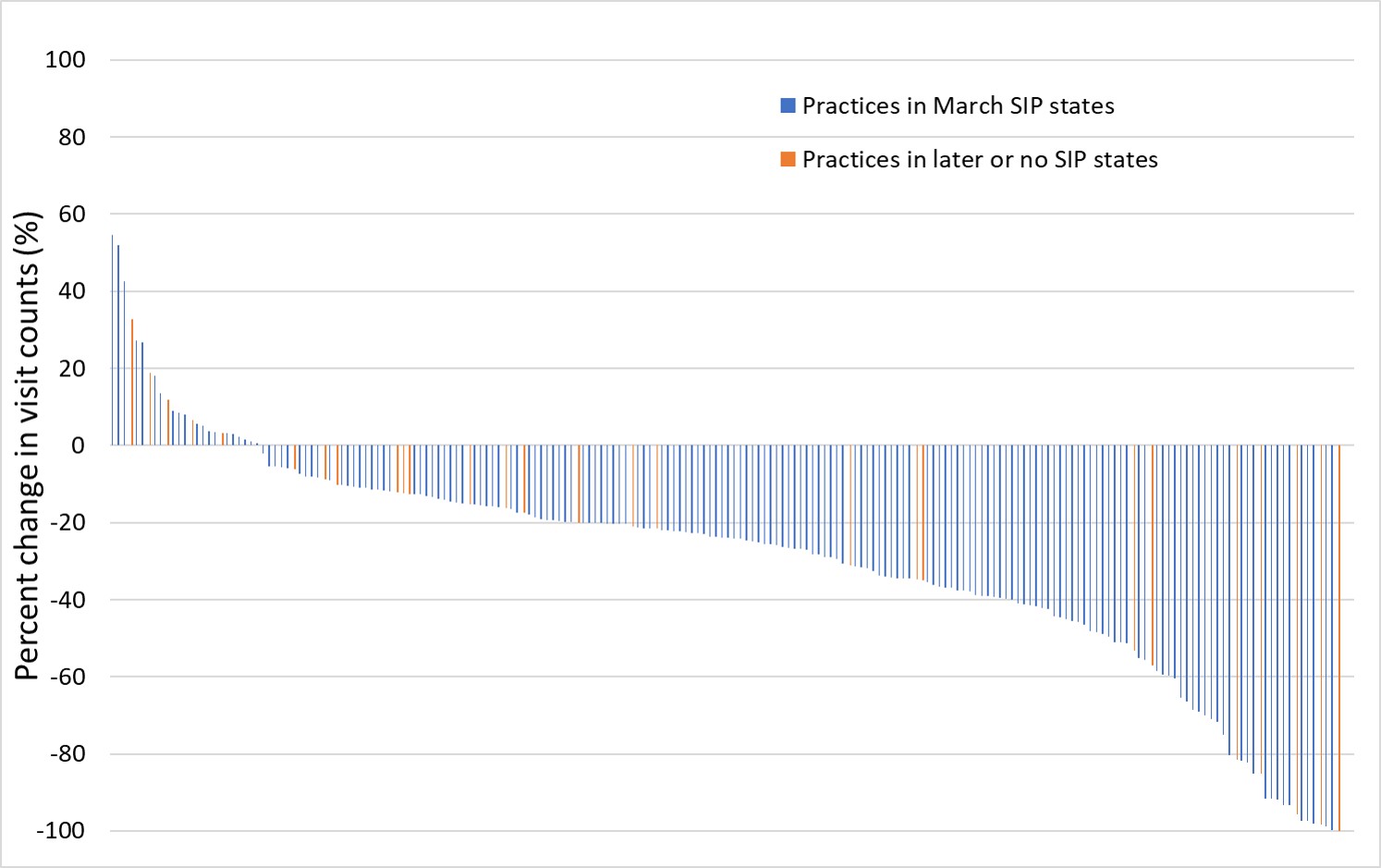Session Information
Session Type: Abstract Session
Session Time: 10:00AM-10:50AM
Background/Purpose: The SARS-CoV-2 global pandemic has resulted in major disruptions to medical care, including rheumatology. We aimed to understand the changes in clinical visit counts from rheumatology practices across the U.S.
Methods: RISE is a national, EHR-enabled registry that passively collects data on all patients seen by participating practices, reducing the selection bias that may be present in more highly selected data sources. As of March 2020, RISE held data from 1,383 providers in 325 practices, representing ~39% of the U.S. clinical rheumatology workforce. Practices included in this study were required to have been participating in RISE from January 2019 through March 2020 and have visit data available (N=204). We obtained state-specific information on shelter-in-place (SIP) orders related to the pandemic and categorized each practice as being in a state where SIP was instituted in March 2020 vs. later or not at all.1 We analyzed visit counts (of all types – face-to-face and virtual visits combined) from RISE practices in the month of March 2020 and compared these to visit counts from March 2019. We also compared the change in visit counts according to the timing of SIP orders by state.
Results: 204 practices were included: 57% were single specialty group practices, with a median of 3 providers. Characteristics of patients seen at these practices were similar at the 2 time points (66% white, 75% female, mean (SD) age of 62 (15)). Overall, we found visit counts decreased by 34% (178,875 to 118,065) from March 2019 to March 2020 (see Figure). 168,126 unique patients were seen in March 2019 vs. 111,238 in March 2020, representing a 32.6% decrease. Almost 90% (179/204) of practices had reduced visit counts, regardless of the timing of the SIP order in their state. However, reductions were more dramatic in states where SIP orders were in place earlier: 64.4% (114/177) of March SIP practices had a > 20% decrease in visits vs. 44.4% (12/27) for those with later or no SIP orders (p=0.047)
Conclusion: We detected a significant decrease in rheumatology visits in March 2020 during the SARS-CoV-2 global pandemic compared to one year prior. The decrease in face-to-face visits may be underestimated because we were unable to distinguish between face-to-face and virtual (telemedicine) visits. Future work should address possible changes in patient outcomes due to decreased contact with clinicians. In addition, research using large observational datasets such as RISE will likely need to take this secular event into account.
Disclaimer: This data was supported by the ACR’s RISE Registry. However, the views expressed represent those of the authors, not necessarily those of the ACR.
 Percent change in visit counts for RISE practices, March 2020 compared to March 2019 1: https://www.usatoday.com/story/news/nation/2020/03/30/coronavirus-stay-home-shelter-in-place-orders-by-state/5092413002/
Percent change in visit counts for RISE practices, March 2020 compared to March 2019 1: https://www.usatoday.com/story/news/nation/2020/03/30/coronavirus-stay-home-shelter-in-place-orders-by-state/5092413002/
To cite this abstract in AMA style:
Li J, Ringold S, Curtis J, Michaud K, Johansson T, Yazdany J, Schmajuk G. Decreased Visits in RISE Practices Due to the SARS-CoV-2 Global Pandemic [abstract]. Arthritis Rheumatol. 2020; 72 (suppl 10). https://acrabstracts.org/abstract/decreased-visits-in-rise-practices-due-to-the-sars-cov-2-global-pandemic/. Accessed .« Back to ACR Convergence 2020
ACR Meeting Abstracts - https://acrabstracts.org/abstract/decreased-visits-in-rise-practices-due-to-the-sars-cov-2-global-pandemic/
